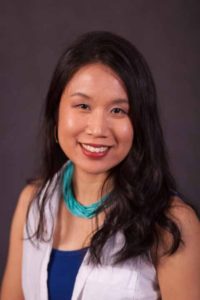By Jennifer Ju
Facing Ourselves

Jennifer Ju
Close your eyes for a moment. What is the first thing that comes to mind when you hear the word American?
Being considered American can unfortunately depend on the eye of the beholder. Although this country was forged on the backs of many races, an image of the dominant, majority race may be what people initially think of when asked to picture an American.
Many years ago, when an opponent’s rallying cry was “Vote American,” I had confidently declared, “I am as American as every one of you. Go ahead and ‘Vote American.’ Vote for the best American.”
In light of the increasing violence against minorities and the expansion of the us versus them mentality, I wonder if my response was misguided naivete. Is the definition of American as broad and encompassing as we are led to believe? Who really “belongs” here?
The answer to those questions is not as straightforward as one would hope. If minorities are viewed as “other” and their approval rating falls, they often find themselves shunned and unwelcome. Minorities who are American citizens may still be told, “Go back to your country.” This kind of statement is baffling at best, demeaning and wounding at worst. Yet this kind of rhetoric is heard all too frequently.
On the other hand, when minorities are considered “acceptable,” they may be met with seemingly benign questions, such as “Where are you from? No, really, where are you from?”
My own parents, who have been citizens of this country for decades, were repeatedly asked this question by an elected official at a ribbon cutting ceremony a few years ago. When I was introduced to a public servant this past month, they wanted to know what my “real” name was and “where I was really from.”
Questions like these, even when well-meaning, are examples of microaggressions. Yet when minorities speak up and seek to educate others, they are often admonished. “Relax,” they are told. “You know people mean well. They don’t mean any harm. They’re just curious, that’s all.”
With these admonitions comes a silent shaming, as if the minorities are to blame for being too sensitive or for not being able to take a joke. These kinds of questions or comments may be harmless or even be indicative of a genuine desire to connect. But they are also rooted in the perception that minorities are foreigners.
Ask yourself when the last time was that anyone of European ancestry, who was born and raised in this country, was told, “Wow, I’m impressed, you speak English real good.” The irony of the grammatical error in that statement, while amusing, does not lessen the blow to the minority to whom the statement is directed.
It is true what they say about the road paved with good intentions. Microaggressions escalate if unchallenged and can intensify with the shifting tides of majority public opinion. As a minority, innocent questions and assumptions can quickly change to unjust blame for a pandemic or resentment for allegedly taking jobs from “real” Americans, and can lead to vicious, unprovoked attacks.
It is no wonder that many minorities feel like they are constantly on edge, as if their acceptance can turn on a dime. They wonder on which side of the race approval coin they fall today.
This simmering uncertainty does not foster a sense of security. When one feels that safety and belonging are tenuous or threatened, the survival instinct, commonly known as “fight or flight,” kicks in, which makes one more hypervigilant and does not encourage connection with others.
At other times minorities may decide to ingratiate themselves into the majority culture to be more acceptable. Be compliant. Agreeable. Know their place. Temper their reaction to injustice. Edit their thoughts, carefully presenting them in an acceptable manner. Blend in, do not offend.
This type of dynamic is not sustainable, however. It breeds contempt and division, rage and grief.
What is the antidote to ignorance? Perhaps it begins with honest reflection. Let’s ask ourselves: do we truly believe that we stand united? If we do, then are we standing shoulder to shoulder or on the backs of others? Are we all equal shareholders in life, liberty and the pursuit of happiness? With whom does the responsibility for equality and justice fall? Let’s open our eyes and look into the mirror together, answering, “It starts with me.” Let’s truly be “We the people.”
Jennifer Ju, MD is a physician who is a graduate of the Brown University family medicine residency program. She is also an actor and writer who has performed in various theatres across the state and whose plays have been produced locally. Ju has also presented numerous online and in-person workshops on mindfulness, health and wellness for parents and children, as well as for pre-K-12 educators in New Haven and Fairfield counties.